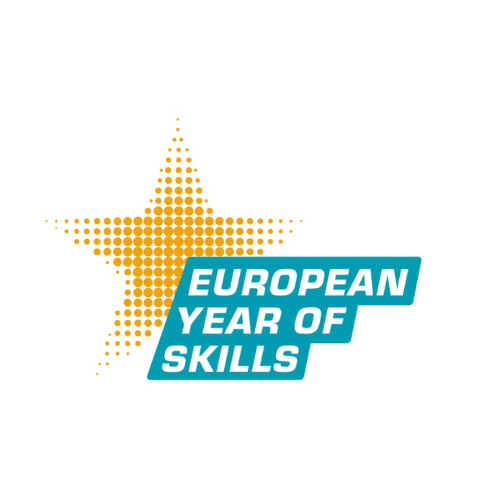
A workforce with the right skills, much more focus in investment on professional education and upskilling, speeding up and facilitating the recognition of qualifications also of third country nationals. These are some of the elements of President von der Leyens State of the Union Address of 14 September 2022, in which she proposed to make 2023 the European Year of Skills. After reaching a political agreement, the European Year of Skills was given shape, starting with the European Year of Skills Festival on 9 May 2023 and continuing until May 2024 with a broad range of actions and initiatives.
Every year on 9 May Europe Day is held to celebrate peace and unity in Europe. This year, it also was the starting signal for the European Year of skills, with a Festival. The main event was hosted at Cité des Métiers in Brussels. This location was carefully chosen. The Cité des Métiers is a centre for information and advice on vocational training run by the Brussels Public Employment Service network, making it the perfect venue to focus on the main aims of the festival and the whole European Year of Skills:
- inspire stakeholders to invest in skills and the general public to think more about their skills;
- make gaining new skills accessible to everyone, regardless of their current skill level.
The festival want to emphasise the need for lifelong learning. Developing skills should not stop at school. Reskilling and upskilling are essential, not only to enable all individuals to develop, but also to drive competitiveness of European companies, in particular SME’s. For them, it is crucial to realise the full potential of the digital and green transitions, something that is impossible without a skilled workforce.
Skills for you!
The past few years have been quite turbulent. The COVID-19 pandemic and Russia’s war of aggression against Ukraine have brought vulnerabilities to the surface, such as labour mismatches and the digital gap. Furthermore, the right skills are needed to ensure that the green and digital transitions are socially fair and just. This is elaborated in the 2030 Digital Compass and the Green Deal Industrial Plan.
The European Skills Agenda of 2020 expresses the intention to empower individuals to successfully navigate labour market changes and to fully engage in society and democracy, so that nobody is left behind.
Also, according to the EU 2030 social targets, every year at least 60% of adults should participate in training, in order to meet the employment rate target of at least 78% by 2030.
This is the background of the European Year of Skills. The Commission, the European Parliament, Member States, social partners, public and private employment services, chambers of commerce and industry, education and training providers, workers and businesses will work together to promote skills development, thereby improving professional and life opportunities for people. Four main objectives are put forward:
- promoting investment in training and upskilling, enabling people to stay in their jobs or find new ones;
- ensuring skills match the needs of employers, by closely cooperating with social partners and companies;
- matching people’s aspirations and skill sets with opportunities on the job market, especially for the green and digital transition and the economic recovery;
- attracting people from outside the EU with the skills needed.
Something old, something new
During the European Year of Skills the focus will be on the further implementation of existing instruments. To strengthen the ongoing efforts, new EU proposals will be adopted. The Commission will adopt a digital education and skills package to improve digital skills, education and training. A EU talent pool will be launched, wanting to facilitate international recruitment. Industry, vocational and education providers, social partners, public employment services and others will create more partnerships to commit to training and investing in the reskilling of workers. These are just some of the examples. Apart from the festival, two other key events are planned in 2023: Making Skills Count on 8-9 June and The European Vocational Skills Week 2023 from 23 to 27 October.
All information on the European Year of Skills, its objectives and activities can be found on the website.
